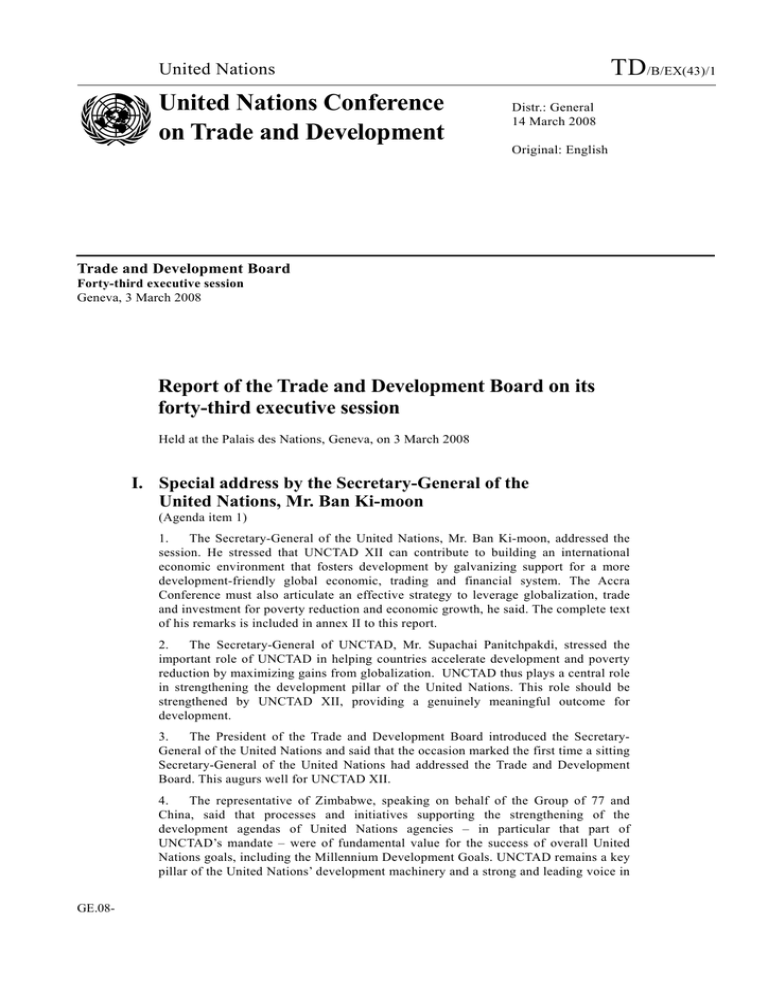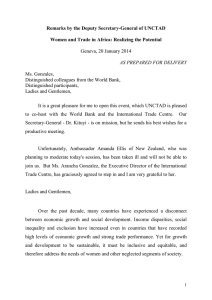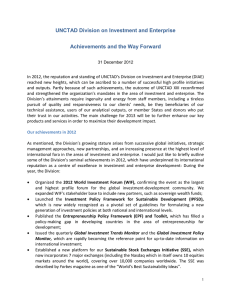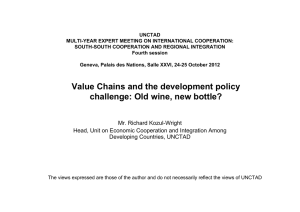TD United Nations Conference on Trade and Development
advertisement

TD/B/EX(43)/1 United Nations United Nations Conference on Trade and Development Distr.: General 14 March 2008 Original: English Trade and Development Board Forty-third executive session Geneva, 3 March 2008 Report of the Trade and Development Board on its forty-third executive session Held at the Palais des Nations, Geneva, on 3 March 2008 I. Special address by the Secretary-General of the United Nations, Mr. Ban Ki-moon (Agenda item 1) 1. The Secretary-General of the United Nations, Mr. Ban Ki-moon, addressed the session. He stressed that UNCTAD XII can contribute to building an international economic environment that fosters development by galvanizing support for a more development-friendly global economic, trading and financial system. The Accra Conference must also articulate an effective strategy to leverage globalization, trade and investment for poverty reduction and economic growth, he said. The complete text of his remarks is included in annex II to this report. 2. The Secretary-General of UNCTAD, Mr. Supachai Panitchpakdi, stressed the important role of UNCTAD in helping countries accelerate development and poverty reduction by maximizing gains from globalization. UNCTAD thus plays a central role in strengthening the development pillar of the United Nations. This role should be strengthened by UNCTAD XII, providing a genuinely meaningful outcome for development. 3. The President of the Trade and Development Board introduced the SecretaryGeneral of the United Nations and said that the occasion marked the first time a sitting Secretary-General of the United Nations had addressed the Trade and Development Board. This augurs well for UNCTAD XII. 4. The representative of Zimbabwe, speaking on behalf of the Group of 77 and China, said that processes and initiatives supporting the strengthening of the development agendas of United Nations agencies – in particular that part of UNCTAD’s mandate – were of fundamental value for the success of overall United Nations goals, including the Millennium Development Goals. UNCTAD remains a key pillar of the United Nations’ development machinery and a strong and leading voice in GE.08- TD/B/EX(43)/1 the global development community. In respect of UNCTAD XII, he stressed that the outcome should encompass new and emerging issues such as climate change and migration, and provide new stimulus to traditional issues such as commodities and South–South trade. It should also result in a strengthening of UNCTAD’s three pillars of work. 5. The representative of Brazil, in his capacity as chair of the Group of 77 and China Preparatory Committee, said that UNCTAD needed to strengthen its capacity to contribute to the United Nations development efforts. UNCTAD XII should build on the achievements of the São Paulo Consensus, take up new and emerging issues at the forefront of trade and development such as climate change, contribute to strengthening the development dimension of the Doha Round of trade negotiations, support the emergence of a dynamic South and South–South economic cooperation, enhance the contribution of commodities to development, and take a firm stance against protectionism against trade and investment from developing countries. He confirmed the participation of the President of Brazil and the Minister of Trade at UNCTAD XII. 6. The representative of Slovenia, speaking on behalf of the European Union, said that UNCTAD was an important part of the United Nations development machinery and could make a significant contribution in helping developing countries reach their development objectives, including through its support for the achievement of the Millennium Development Goals. 7. The representative of the Russian Federation, speaking on behalf of Group D, emphasized that UNCTAD continued to play an important role in promoting trade and development, not only for developing countries, including least developed countries, but also for countries with economies in transition. 8. The representative of Ghana said that her country was preparing for UNCTAD XII with great pride and anticipation, in close cooperation with the UNCTAD secretariat. II. Preparations for UNCTAD XII (Agenda item 2) 9. Ms. Lakshmi Puri, Acting Deputy Secretary-General of UNCTAD, presented an overview of the proceedings for UNCTAD XII – which will be held 20–25 April 2008 in Accra, Ghana – including some of the pre-conference events. 10. Mr. Kobsak Chutikul, Special Adviser to the Secretary-General of UNCTAD, presented the updated programme for UNCTAD XII. 11. The representative of Ghana presented information concerning visas, transportation, accommodations, infrastructure, security, vaccinations and other practical information for those traveling to her country for UNCTAD XII. III. Organizational matters A. Opening of the session 12. The session was opened by Mr. Petko Draganov (Bulgaria), President of the Trade and Development Board. 2 TD/B/EX(43)/1 B. Adoption of the agenda and organization of work 13. In accordance with the notification sent to delegations on 29 February 2008, the Board adopted the agenda as follows: 1. Special address by the Secretary-General of the United Nations, Mr. Ban Ki-moon 2. Preparations for UNCTAD XII 3 TD/B/EX(43)/1 Annex I Attendance 1. Representatives from the following States members of the Trade and Development Board attended the session: Albania Algeria Angola Argentina Austria Azerbaijan Bangladesh Belarus Bhutan Botswana Brazil Bulgaria Cameroon Chad China Côte d’Ivoire Croatia Cuba Cyprus Czech Republic Djibouti Egypt Estonia Finland Germany Ghana Greece Honduras Hungary India Indonesia Iran (Islamic Republic of) Iraq Ireland Israel Italy Jamaica Japan Jordan Kenya Lao People’s Democratic Republic 2. The following observer States were represented at the session: Holy See Kazakhstan 4 Kuwait Lithuania Luxembourg Malaysia Mauritius Mauritania Mexico Monaco Mongolia Morocco Myanmar Nepal Netherlands Nigeria Oman Paraguay Peru Republic of Korea Romania Russian Federation Saudi Arabia Serbia Singapore Slovenia South Africa Spain Sri Lanka Sudan Sweden Switzerland Syrian Arab Republic Thailand The former Yugoslav Republic of Macedonia Tunisia Turkey Uganda Ukraine United Arab Emirates United States of America Yemen Zimbabwe TD/B/EX(43)/1 3. The following intergovernmental organizations were represented at the session: African, Caribbean and Pacific Group of States African Union Agency for International Trade Information and Cooperation European Community International Organization for Migration South Centre 4. The following United Nations agencies were represented at the session: International Trade Centre United Nations Development Programme United Nations Environment Programme 5. The following specialized agencies were represented at the session: International Labour Organization International Monetary Fund United Nations Industrial Development Organization World Health Organization World Intellectual Property Organization World Trade Organization 6. The following non-governmental organization attended the session: Village Suisse 5 TD/B/EX(43)/1 Annex II Special address by the Secretary-General of the United Nations, Mr. Ban Ki-moon It is a great honour to be here today, and to have this opportunity to share my vision of a United Nations system that truly delivers on our development agenda. I am especially glad that our discussion is taking place in the crucial period leading up to this April’s UNCTAD XII Conference in Accra. As you know, I recently completed my first year as Secretary-General of the United Nations. It proved a remarkable, and remarkably challenging, period. We made progress on the situation in Darfur, and beat the drum on climate change. We worked hard to strengthen confidence in the work of the organization, and successfully implemented much-needed reforms in several key areas. But, for me, personally, the lasting impressions from these first 12 months remain in many trips to the field. These visits, across Africa, in Latin America and around Asia and the Middle East, brought me into contact with some of the most vulnerable people we are all sworn to serve. I met refugees in Sudan, and heard from slum dwellers in Kenya. I saw the courage of people living with HIV/AIDS, and the resilience of survivors of war and genocide. I heard from women who trek miles every day to fetch water, and of children who are too hungry to even think about school. Everywhere I travelled, I was deeply touched by the resolve and fortitude of these men, women and children whom the world seems to have forgotten. They are the poorest of the poor, the nearly 1 billion left behind by global growth. Most live in Africa or in parts of Asia, eking out lives of hardship on less than $1 a day. I firmly believe that the international community owes a special duty to these people. That is why I began this year with a call to rededicate ourselves to the needs of these individuals. I have asked for 2008 to be the year of the “bottom billion”. For this reason, in the coming weeks and months, I will dedicate myself to strengthening the United Nations’ role in development. We have to reenergize our efforts towards the Millennium Development Goals. Halfway to our 2015 target, many nations have fallen behind. In fact, not a single country in sub-Saharan Africa is on track to achieve the goals on time. Now is the time for new ideas and fresh approaches. To address this alarming situation, I have already established the MDG Africa Steering Group. Since last September, the group has been working intensively to mobilize the full resources of the United Nations system and its partners to advance the goals in Africa. The steering group is tasked with identifying strategic ways in which the international community can better support national Governments implement existing MDG programmes. It is also charged with proposing new mechanisms where necessary. And it seeks to realize aid that has been long promised but never delivered. This effort must involve all our partners, from international financial and development institutions, to NGOs and the private sector. In particular, all United Nations member States – developed and developing, North and South – must work together towards these goals. 6 TD/B/EX(43)/1 I expect this process will receive a crucial boost in April, when world leaders gather in Accra for UNCTAD’s conference on trade and development. Later this year, together with the President of the General Assembly, I will also convene a high-level event on the MDGs in September. Before that, on 10 March I will convene again the MDG Africa Steering Group with the attendance of all agencies concerned. I see the meeting in September as a valuable opportunity to reinforce the partnership between developed and developing countries, and to focus attention, at the very highest level, on the needs of the poorest of the poor. Last year, we used a similar gathering to building momentum on climate change. This year, we will do the same for the bottom billion, who have been bypassed by global growth. We must work to raise the living standards of the desperately poor by working to raise incomes. This is why improved and equitable economic growth and the creation of decent jobs are so important. In a globalizing world, we also require an international economic environment that fosters development. The Accra Conference can advance this aim by galvanizing support for a more development-friendly global economic, trading and financial system. Accra must also articulate an effective strategy to leverage globalization, trade and investment for poverty reduction and economic growth. It must help build consensus on how the current impasse in the Doha Round negotiations can be broken so that we can fulfill the promised development agenda. And it must promote trade and financial policies that help scaling up MDGs in subSaharan Africa, which is the epicenter of a development emergency. Even as I work with you to rally international support, I am striving to increase the United Nations’ own effectiveness in advancing its development priorities. I have repeatedly said that we should be measured by our results, not just our rhetoric. Today’s United Nations cannot simply champion development; it must deliver every day on its promises. In December, the General Assembly asked me to suggest measures to improve the development-related activities of the United Nations Secretariat. This resolution gave me the opportunity to undertake a comprehensive review of our development machinery and programming. I am pleased to inform you that before flying to Geneva, I transmitted my report to our membership. I am grateful to Dr. Supachai for his help in preparing the document. Let me also use this opportunity to urge all member States to carefully consider the report’s recommendations. My proposals aim to address critical capacity gaps faced by the Secretariat, including UNCTAD. They cover several key areas such as the scaling up of activities in support of the MDGs, or bolstering economic development, trade and finance. While comprehensive in its coverage, my report should not be viewed as an isolated exercise. Instead, it should be seen as part of my broader effort to improve the capacity and functioning of the United Nations system. These efforts are based on the premise that development cannot be a privilege for the few. It is a right for all. And I strongly believe that it is up to each and every one of us at the United Nations to help advance this universal right. I cannot overemphasize the urgency of this moment. Midway to the MDG target date, we have reached a tipping point. Urgent and concerted action now can help make up for wasted time and effort. But should we delay or dither, we risk squandering even 7 TD/B/EX(43)/1 existing gains to the negative effects of climate change, or to emerging challenges like slowing global growth. That is why your deliberations in the run-up to the Accra Conference are crucial. You can help set the stage for a successful UNCTAD-XII Conference in Accra this April. You can help build momentum for the high-level event in September. And you can help push us over the tipping point in 2008. In that spirit, I wish you productive discussions, and I look forward to meeting you again in Accra. 8






